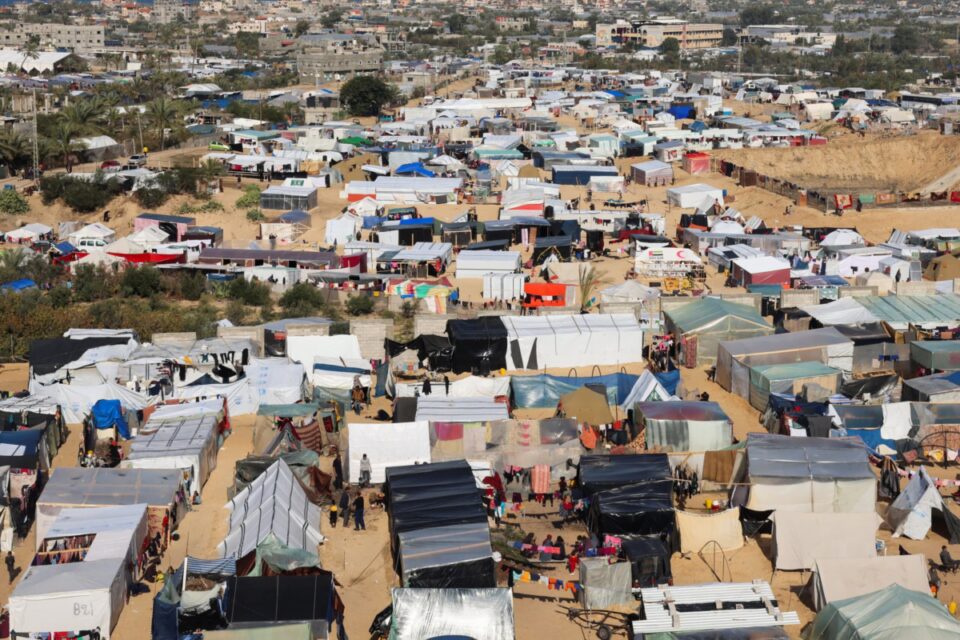GAZA, Jan. 16 — The residents of Gaza who are currently in Rafah after being forced to relocate due to Israeli attacks not only face issues of food and medicine shortages but also grapple with the extreme cold weather, as reported by the Palestinian News and Information Agency (WAFA).
In a tent made of cloth and plastic in the middle of a desert located at the southern border of the Gaza Strip, Palestine and Egypt, Ismail Nubhan sits with his children and grandchildren around a fire to keep warm.
Nubhan, 60, said, “Two days ago, the wind was very strong. Throughout the night, we stayed awake to ensure that the nylon tent strings didn’t break. We live in the desert, facing the sea. It’s extremely cold, and even colder at night.”
The tent, shared by 28 individuals, is also enveloped in black smoke with a plastic smell that pierces the nose.
His wife, Raeda Awad, 50, remarked: “Without fire, we’re cold. With fire, we have to inhale the plastic smoke that chokes our chests.”
This family’s tent is just one of the thousands of refugee tents built south of Gaza Strip, which is still under siege by Israel. It is located hundreds of meters from the Mediterranean Sea, southwest of the city of Rafah, near the Egyptian border.
Sitting next to her coughing grandchild, Awad said: “All the children are sick due to this toxic smoke. They have continuous coughs and runny noses. The clothes are not enough to keep them warm.”
“Blankets are definitely insufficient. Three people share one blanket,” she added, pointing out the damp wood and plastic used to light the fire, which takes at least four days to dry.
In another tent, Muhammad Kahil, 35, from northern Gaza, said, “We have no food, water, or heaters. It’s not impossible that we’ll freeze to death here.”
Haneen Adwan, 31, who moved from the Nuseirat camp in central Gaza zone to Rafah, said, “There is no source of heat other than fire, but the price of firewood is very high, and we don’t have money.
“So we light the fire with plastic, and as a result, this is what happens… we struggle to breathe,” explained the mother of six.
Her son, Fadi, 14, added, “We have to light something, or else we will freeze to death.”
In a nearby tent, Khaled Farjullah, 36, is warming himself while preparing bread for his six children, including one with special needs.
“Here, after 2 a.m., no one can sleep because the weather is extremely cold. Even if I put a thousand blankets, the ground will still feel very cold and damp,” he said.
The war, launched by the Israeli occupation forces against the Palestinian people in the Gaza Strip by land, sea, and air since October 7, has claimed more than 24,000 lives and injured nearly 70,000, in addition to severe destruction of buildings and infrastructure.
The United Nations Relief and Works Agency for Palestine Refugees in the Near East (UNRWA) stated that about 1.9 million people, or nearly 85 per cent of Gaza’s population, are estimated to have lost their homes.
A joint statement by the World Health Organisation (WHO), the World Food Programme (WFP), and the United Nations Children’s Fund (UNICEF) emphasised the urgent need for a drastic change in humanitarian aid flow to the Gaza Strip.
Statistics published by the Palestinian Central Bureau of Statistics document that a total of 290,000 buildings and infrastructure units in the Gaza Strip have been destroyed due to ground, air, and sea bombings by the occupation forces in 100 days.
According to the Palestinian Ministry of Public Works and Housing, over a quarter of a million housing units have been destroyed to varying degrees, more than 35 per cent of urban areas have been obliterated, and over 40 per cent of infrastructure has been completely destroyed, including roads, water networks, sewage systems, and electricity and communication lines.
— Bernama





